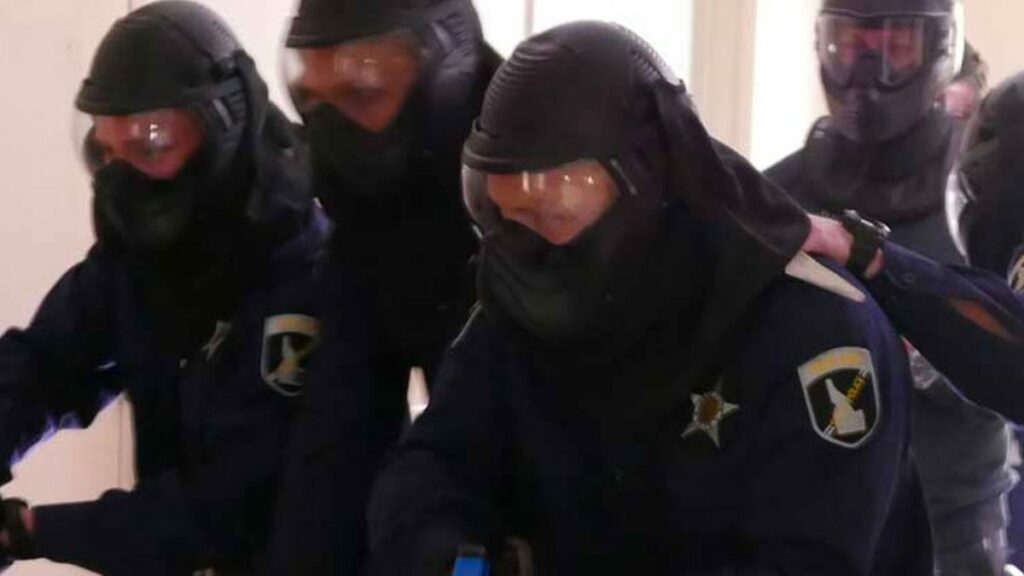VR Training for the Military & Law Enforcement
David: So JennyQ, we have been working with virtual reality for over five years now, but the military has been working with some form of VR going clear back into the seventies and eighties and with meaningful results, especially looking at the last 5 years or so.
Using virtual reality for training was not only groundbreaking, but it was revolutionary in the decades past. Well, let’s fast forward to now. And you can take a look at officers and I’ve heard the term apex officer. That’s the officer that is, well let’s put it this way, the king of the pack.
They have the ability to take the soldiers that work underneath them, and then put them into live fire, or what feels like a live fire situation and they can train, they can train for team building. They can train for tactical strategy. They can train in ways that will ultimately potentially save their lives and accomplish their mission.
And what is not to love about a technology that can train a soldier better to accomplish his mission. Now, these scenarios are multifaceted. In fact, just as in the seventies, the eighties the nineties, and the early two-thousands, military-grade hardware is expensive. And that is what differentiates us today in the fact that we have VR training hardware that we carry around in your pocket, your smartphone.
JennyQ: Well, right. With the training software that goes with your phone, your device, you’d literally have your training with you everywhere you go.
David: And the big deal is that it’s really affordable. But stepping back to the military, if you think about it, We can draw so much from the value of virtual reality for training, because I guarantee you the military doesn’t do anything that is not first-rate and is not good for the soldiers to enhance accomplishing their missions and learning new skills, tactics, and procedures.
JennyQ: And when we think about it, it’s easy to take the leap from the military to law enforcement… to think about how virtual reality will be the future for enhancing law enforcement training. We already have the track record and the proof with the military. Just think of the scenarios you could come up with for law enforcement training.
David: Absolutely. In fact, we have a use case for VR training in Law Enforcement. We were doing some work for the State Police, Post Academy. The Post Academy teaches new recruits the many skills necessary to a State Police officer. We create a VR training app that teaches new officers the “Pit Maneuver”. It’s a technique to disable a car in a high-speed chase so that a suspect can be caught in a safe manner.
The Pit Maneuver is actually a fairly complex technique that requires an officer to maneuver his vehicle is a very specific way to bump the rear of the suspect car in a very specific way to maintain the safety of all individuals. It requires a high degree of expertise in executing the maneuver so that the car being chased, spins it out. We built a VR training app to teach the pit maneuver to the new recruits.
Prior to our app, recruits would have been shown pictures and YouTube videos in a PowerPoint demonstration prior to going out on the live practice track. With our app they were able to practice the Pit Maneuver with a Sergeant instructing them. They are in the car, they could see the maneuver being executed when it comes to where to the gas and brake pedals, what your hands are doing, and the speed of the cars. They have the advantage of looking at the maneuver from multiple vantage points as if they were actually in the vehicle and from both the chase car and the car being chased. In other words, they can practice the “feel” of a complex procedure in complete safety prior to going out on the live track.
Here the plus, prior to using our VR training app they would damage multiple vehicles because the recruits did not have the “feel” of the process. I mean, how much can you learn from looking at a picture or video in PowerPoint. It’s like you’re throwing somebody into a football game as a quarterback that has never held a football before. With our training app, recruits can practice the process over and over again in a safe environment. And… they haven’t damaged a car since including virtual reality into their curriculum.
JennyQ: So, because police officers were trained with virtual reality, what would you say has been the proven ROI of that in this specific instance?
David: Well, for the guys that were tasked with fixing the car, it’s a real loss. Because obviously they don’t get as much work, but for the State Police, it’s not only that you don’t damage the patrol cars, but the fact that you actually have a proven methodology that you can train with so that the recruits are more engaged. They have an understanding of the process and a start in developing the mental muscle memory to successfully perform the task, and it’s a more focused experience when they go out on the live track.
And another advantage of VR training simulation is that in six months or a year they can use the app as a refresher. Maybe they’re up in an area in rural Idaho where people don’t usually run from the law. How often to those officers get to practice the pit maneuver, yet because officers move around and you want to have them those skillsets. Now we have a training tool available for them based on a phone and virtual reality headset that they can practice a valuable skill set.
JennyQ: Right… And speaking of law enforcement training today, one of the hot topics is empathy training. How does VR simulation support the police officers when it comes to understanding and reacting to difficult situations, especially dealing with the mentally ill?
David: Great question, the academy does live simulations all the time.
They hire actors and actresses. Those actors and actresses are trained to portray a certain circumstance or situation. They might be suffering from a mental illness. Maybe somebody that’s drunk, on drugs, or maybe somebody that’s aggressive. And so how do you take the cost of creating those live simulations, where you can only train a few officers at a time and do a force multiplier when it comes to using technology? That where VR comes in. Virtual reality training can capture that simulation, add in interactivity and testing… and be available not to just a few officers, but to any officer or recruit that might want to load up that simulation on their phone.
VR training can be used as a precursor to a live training session or simulation so that the recruit or officers familiar with the content, has experienced the content, and then they are much more focused within the live simulation and can benefit to a higher degree from using VR as a precursor to the exercises.
Let’s take a virtual reality simulation for schizophrenia, the officer or recruit can actually experience what it feels like to have this disorder. They hear voices, they see things in the world that aren’t actually there, they feel the disorientation, the distraction and yes sometimes the aggravation that a person suffering from schizophrenia feels. When we have this type of simulation and officer can build up understanding and empathy for that individual so when they are actually confronted in the field they may react to an aggressive situation with more empathy and understanding than might be typical.
Virtual reality truly puts an individual in somebody else’s shoes from a metaphorical standpoint and allows them to understand someone suffering from a different reality and to learn and benefit from that experience.
So, does virtual reality or VR training apply to training for the military and law enforcement? Absolutely. If you’d like to learn more click on the button below. We’d be happy to schedule a 30-minute call just to talk about the needs of your organization and how it might apply to this new technology.
You can always check our website for further information! I appreciate your time. Thank you.


